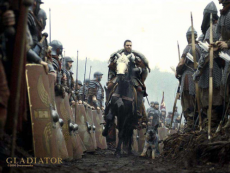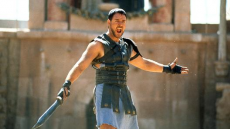
The film score. The part of a film that is often so tragically under-rated. Yet, if you were to watch a film without its score, I think you would find it to be an entirely different experience, and not a good one at that. There would be no real sense of tension created, no danger, no pathos; music is what ultimately provides a film with its humanity, its raw emotion. This article will be the first of a few looking at the scores from famous films that are continuously voted as the nation’s favourite film themes. In this article, we are going to look at the score from the film ‘Gladiator,’ and how the music massively impacted the film, rendering it a modern cinematic masterpiece.
The film ‘Gladiator’ was released in 2000, starring Russell Crowe as a fictional Roman commander , Maximus, who is betrayed, leaving him to fight his way out of slavery by becoming a gladiator. As a film, ‘Gladiator’ received mostly positive reviews, and the score itself was nominated for an Oscar. Famous composer Hans Zimmer and singer Lisa Gerrard composed the score. It has been said to draw influence from various classical works by the composers Holst and Wagner.
Due to the film being a ‘historical epic,’ it relies on a lot of dramatic scenes with physical brutality and extreme tension between characters. Simply the actors and the background themselves are not enough to convey to an audience the harshness and emotion of the situations, and so, this is where the score comes in.
‘The Battle’ is a piece from the score lasting around ten minutes. This piece in particular is suggested to derive themes from Holst’s work, ‘Mars, the bringer of war.’ A later track, ‘The Barbarian Horde,’ also features these themes. ‘The Battle,’ provides a soundtrack to one of the opening scenes of the film, wherein Crowe is leading an army in a battle for Germania. Inevitably, there are numerous fight sequences and deaths, so the scene is incredibly tense and filled with impending danger. To really demonstrate this to the audience, Zimmer presents us with a beautifully multi-faceted work, which moves with fluidity between increasingly darkening musical themes.
The piece begins with a prominent military drum beat that you are constantly aware of, which gives the piece a more sombre tone, reminding us of the severity of war. A muted brass section accompanies this beat, complete with mellisonant harmonies within the horn section. The horns play a complex theme – there is a real feeling of desolation, and yet, with the harmonies rising into major chords, we as an audience can feel that there is still a sense of hope remaining. The brass crescendos, somewhat removing the fear from the incessant military percussion. Strings seep into the score, seemingly adding to the feeling of hope, before continuing to rise in pitch, unnervingly so, until the strings almost sound dissonant, making us feel uncomfortable, before amalgamating into the second theme of the piece.
The next theme features rich layers of vocals on top of each other, creating an almost eerie sound, before leading into plucked strings and the entire orchestra performing a repetitive staccato theme in a minor key. Typically repetition would be boring, but for a film, it is important to establish central musical themes or ‘motifs,’ so as to remind the audience of other scenes, but also repetition can serve to create a sense of urgency and danger, which is especially useful with a historical film such as this which focuses on aspects of war. Equally, choices in orchestration prevent the score from ever becoming boring. We have a lead violin coming in to play variants of the musical theme in this piece, which because of its high register, also helps to give a feeling of fear.

The most notable track from the score was composed by Lisa Gerrard, and entitled, ‘Now we are free,’ which was referencing the idea that those who had died in combat, and Maximus’ murdered family, were now free in the fields of Elysium, ( where Romans believed you would go to when you died) and at peace. This music in particular is crucial to the film and the final scenes, as we see Crowe’s character finally defeated, but now reunited with his family in the afterlife, all the while this beautiful melody is playing. We also see Maximus’ friend who was also a slave, now freed of the gladiatorial ring, with the vow that he would see him again, but ‘Not yet.’ The theme plays quietly in the background behind the dialogue as we see the change of the brutal Commodus’ regime, with the lush brass and orchestral section reaching a dramatic crescendo as Maximus’ body is carried away from the arena. The music diminuendos with a close-up of Maximus’ friend burying his possessions, before reaching a crescendo again with Gerrard’s deep, soulful vocals, perfectly capturing the pathos of the scene.
All in all, I hope that I have demonstrated to you that the film ‘Gladiator’ would not be anywhere near so powerful or emotive without the incorporation of such a wonderful film score, and the same applies to all other films. The music is ultimately what informs our emotions, and makes us react to characters in a certain way, deciding whether or not we feel sympathy or anger towards characters, or whether we feel joyous or despairing at the climax of a scene. So many choices go into the making of a film score, and even something so small, like the use of a flute for a melody can make all the difference in the tone of a piece. So next time you are watching a film, try and listen out for what music is playing in each scene, and how it adds to the scene and what feeling it evokes from you as viewer. Not only will you have a deeper appreciation for the score, and how crucial it is to why you love the film, but also the film itself.
Image 1: http://tragicocomedia.com/2011/07/12/gladiator-the-portrayal-of-the-roman-empire-in-the-cinema/
Image 2: http://www.cnbc.com/id/100949040

0 Comment:
Be the first one to comment on this article.